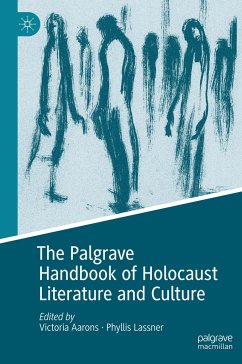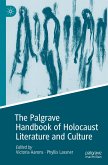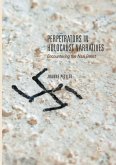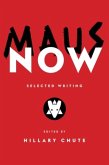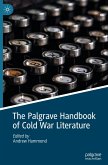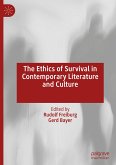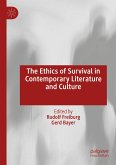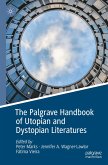The Palgrave Handbook of Holocaust Literature and Culture
Herausgegeben:Aarons, Victoria; Lassner, Phyllis
The Palgrave Handbook of Holocaust Literature and Culture
Herausgegeben:Aarons, Victoria; Lassner, Phyllis
- Gebundenes Buch
- Merkliste
- Auf die Merkliste
- Bewerten Bewerten
- Teilen
- Produkt teilen
- Produkterinnerung
- Produkterinnerung
The Palgrave Handbook of Holocaust Literature and Culture reflects current approaches to Holocaust literature that open up future thinking on Holocaust representation. The chapters consider diverse generational perspectives-survivor writing, second and third generation-and genres-memoirs, poetry, novels, graphic narratives, films, video-testimonies, and other forms of literary and cultural expression. In turn, these perspectives create interactions among generations, genres, temporalities, and cultural contexts. The volume also participates in the ongoing project of responding to and talking…mehr
Andere Kunden interessierten sich auch für
![The Palgrave Handbook of Holocaust Literature and Culture The Palgrave Handbook of Holocaust Literature and Culture]() The Palgrave Handbook of Holocaust Literature and Culture181,99 €
The Palgrave Handbook of Holocaust Literature and Culture181,99 €![Perpetrators in Holocaust Narratives Perpetrators in Holocaust Narratives]() Joanne PettittPerpetrators in Holocaust Narratives63,99 €
Joanne PettittPerpetrators in Holocaust Narratives63,99 €![Maus Now Maus Now]() Art SpiegelmanMaus Now16,99 €
Art SpiegelmanMaus Now16,99 €![The Palgrave Handbook of Cold War Literature The Palgrave Handbook of Cold War Literature]() The Palgrave Handbook of Cold War Literature162,99 €
The Palgrave Handbook of Cold War Literature162,99 €![The Ethics of Survival in Contemporary Literature and Culture The Ethics of Survival in Contemporary Literature and Culture]() The Ethics of Survival in Contemporary Literature and Culture103,99 €
The Ethics of Survival in Contemporary Literature and Culture103,99 €![The Ethics of Survival in Contemporary Literature and Culture The Ethics of Survival in Contemporary Literature and Culture]() The Ethics of Survival in Contemporary Literature and Culture103,99 €
The Ethics of Survival in Contemporary Literature and Culture103,99 €![The Palgrave Handbook of Utopian and Dystopian Literatures The Palgrave Handbook of Utopian and Dystopian Literatures]() The Palgrave Handbook of Utopian and Dystopian Literatures104,99 €
The Palgrave Handbook of Utopian and Dystopian Literatures104,99 €-
-
-
The Palgrave Handbook of Holocaust Literature and Culture reflects current approaches to Holocaust literature that open up future thinking on Holocaust representation. The chapters consider diverse generational perspectives-survivor writing, second and third generation-and genres-memoirs, poetry, novels, graphic narratives, films, video-testimonies, and other forms of literary and cultural expression. In turn, these perspectives create interactions among generations, genres, temporalities, and cultural contexts. The volume also participates in the ongoing project of responding to and talking through moments of rupture and incompletion that represent an opportunity to contribute to the making of meaning through the continuation of narratives of the past. As such, the chapters in this volume pose options for reading Holocaust texts, offering openings for further discussion and exploration. The inquiring body of interpretive scholarship responding to the Shoah becomes itself a story, a narrative that materially extends our inquiry into that history.
Hinweis: Dieser Artikel kann nur an eine deutsche Lieferadresse ausgeliefert werden.
Hinweis: Dieser Artikel kann nur an eine deutsche Lieferadresse ausgeliefert werden.
Produktdetails
- Produktdetails
- Verlag: Palgrave Macmillan / Springer International Publishing / Springer, Berlin
- Artikelnr. des Verlages: 978-3-030-33427-7
- 1st ed. 2020
- Seitenzahl: 856
- Erscheinungstermin: 25. Januar 2020
- Englisch
- Abmessung: 241mm x 160mm x 51mm
- Gewicht: 1429g
- ISBN-13: 9783030334277
- ISBN-10: 3030334279
- Artikelnr.: 57731280
- Verlag: Palgrave Macmillan / Springer International Publishing / Springer, Berlin
- Artikelnr. des Verlages: 978-3-030-33427-7
- 1st ed. 2020
- Seitenzahl: 856
- Erscheinungstermin: 25. Januar 2020
- Englisch
- Abmessung: 241mm x 160mm x 51mm
- Gewicht: 1429g
- ISBN-13: 9783030334277
- ISBN-10: 3030334279
- Artikelnr.: 57731280
Victoria Aarons is O.R. and Eva Mitchell Distinguished Professor of Literature at Trinity University, USA. She is the author or editor of 11 books, including The New Diaspora: The Changing Landscape of American Jewish Fiction (2015); The Cambridge Companion to Saul Bellow (2016); Third-Generation Holocaust Narratives: Memory in Memoir and Fiction (2016); Third-Generation Holocaust Representation: Trauma, History, and Memory (co-authored with Alan Berger) (2017), The New Jewish American Literary Studies (2019), and Holocaust Graphic Narratives: Generation, Trauma, and Memory (2019). Phyllis Lassner is Professor Emerita in The Crown Center for Jewish and Israel Studies and The Gender Studies Program at Northwestern University, USA. Her publications include British Women Writers of World War II (1998), Colonial Strangers: Women Writing the End of the British Empire, and Anglo-Jewish Women Writing the Holocaust (1998). She co-edited the volumes Antisemitism and Philosemitism in the Twentieth and Twenty-first Centuries: Representing Jews, Jewishness, and Modern Culture (2008) and Rumer Godden: International and Intermodern Storyteller (2010). Her most recent book is Espionage and Exile: Fascism and Anti-Fascism in British Spy Fiction and Film (2017).
CONTENTS
1 Introduction: Approaching the Holocaust in the 21st Century
Victoria Aarons and Phyllis Lassner
Part I Memoir
2 Elie Wiesel's Quarrel with God
Alan L. Berger
3 Primo Levi's Last Lesson: A Reading of The Drowned and the Saved
Anthony C. Wexler
4 What We Learn, At Last: Recounting Sexuality in Women's Deferred Autobiographies and Testimonies
Sara R. Horowitz
Part II Fiction
5 Ghetto in Flames: The Warsaw Ghetto Uprising in Early Postwar Jewish Fiction Avinoam Patt
6 The Nazi Beast at the Warsaw Zoo: Animal Studies, the Holocaust, The Zookeeper's Wife, and See Under: Love
Naomi Sokoloff
7 When Facts Become Figures: Figurative Dynamics in Youth Holocaust Literature
Joanna Krongold
8 Jewish Boys on the Run: The Revision of Boyhood in Holocaust Fiction and Film
Phyllis Lassner
9 "I sometimes thought I was listening to myself": Identity-Deliberation after the Holocaust in Chaim Grade's "My Quarrel with Hersh Rasseyner"
Megan V. Reynolds
10 "The Relatedness of the Unrelatable": The Holocaust as Trope in Caryl Phillips's The Nature of Blood
Paule Lévy
11 The Holocaust in Works by Two Yiddish Writers in Argentina: Simja Sneh and Israel Aszendorf
Alan Astro
12 Edgar Hilsenrath's Novels: Der Nazi & der Friseur and Berlin... Endstation
Till Kinzel
13 Transit and Transfer: Between Germany and Israel in the Granddaughters' Generation
Ashley Passmore
14 Holocaust Memories and Polish Catholic Identity: Cultural Transmutations of Warsaw Ghetto Uprising
Rachel F. Brenner
15 Post-Soviet Migrant Memory of the Holocaust
Karolina Krasuska
16 Vasily Grossman and Anatoly Rybakov: Soviet Sources of Historical Memory of the Holocaust
Alexis Pogorelskin
17 Refractions of Holocaust Memory in Stanislaw Lem's Science Fiction
Richard Middleton-Kaplan
Part III Poetry
18 Poetry of Witness and Poetry of Commentary: Responses to the Holocaust in Russian Verse
Marat Grinberg
19 "At Last to a Condition of Dignity": Anthony Hecht's Holocaust Poetry
David Caplan
20 Wound Marks in the Air and the Shadows Within: A Poetic Examination of Dan Pagis, Paul Celan, and Nelly Sachs
Shellie McCullough
21 The Dark Side of Holocaust Era Poetry: Nazi Poetry Promoting Antisemitism and Genocide
Cary Nelson
Part IV Film and Drama
22 Holocaust Drama Imagined and Re-Imagined: The Case of Charlotte Delbo's
Who Will Carry the Word?
Holli Levitsky
23 Wresting Memory as We Wrestle with Holocaust Representation: Reading László Neme's Son of Saul
Gila Safran Naveh
24 Troubled Aesthetics: Jewish Bodies in Post-Holocaust Film
Jessica Lang
25 Screen Memories: Trauma, Repetition, and Survival in Sidney Lumet's The
Pawnbroker
Sandor Goodhart
26 Haunted Dreams: The Legacy of the Holocaust in And Europe Will Be Stunned
Melissa Weininger
Part V Graphic Culture
27 "Master Race": Graphic Storytelling in the Aftermath of the Holocaust
Victoria Aarons
28 The Challenges of Translating Art Spiegelman's Maus
Martín Urdiales-Shaw
29 We Are a Long Way Past Maus: Responsible and Irresponsible Holocaust Representations in Graphic Comics and Sitcom Cartoons
Jeffrey Scott Demsky
30 Claustrophobic in the Gaps of Others: Affective Investments from the Queer Margins
Golan Moskowitz
31 Recrafting the Past: Graphic Novels, the Third Generation and Twenty-First Century Representations of the Holocaust
Claire Gorrara
32 X-Men at Auschwitz? Superheroes, Nazis, and the Holocaust
Edward B. Westermann
33 An Iconic Image through the Lens of Ka-tzetnik: The Murder of the Mother and the Essence of Auschwitz
David Patterson
34 Photographing Survival: Survivor Photographs of, and at, Auschwitz
Tim Cole
Part VI Historical & Cultural Narratives
35 A Reconsideration of Sexual Violence in German Colonial and Nazi Ideology and its Representation in Holocaust Texts
Elizabeth R. Baer
36 The Place of Holocaust Survivor Videotestimony: Navigating the Landmarks of First-Person Audio-Visual Representation
Oren Baruch Stier
37 Beckett's Holocaust
Ira Nadel
38 The Auschwitz Women's Camp: An Overview and Reconsideration
Sarah Cushman
39 Aryan Feminity: Identity in the Third Reich
Wendy Adele-Marie
40 Reconsidering Jewish Rage after the Holocaust
Margarete Myers Feinstein
41 Impossible Holocaust Metaphors: Shoes, Matter, Memory
Sharon B. Oster
42 From Holocaust Studies to Trauma Studies and Back Again
Hilene Flanzbaum
Contributors' Notes
Index
1 Introduction: Approaching the Holocaust in the 21st Century
Victoria Aarons and Phyllis Lassner
Part I Memoir
2 Elie Wiesel's Quarrel with God
Alan L. Berger
3 Primo Levi's Last Lesson: A Reading of The Drowned and the Saved
Anthony C. Wexler
4 What We Learn, At Last: Recounting Sexuality in Women's Deferred Autobiographies and Testimonies
Sara R. Horowitz
Part II Fiction
5 Ghetto in Flames: The Warsaw Ghetto Uprising in Early Postwar Jewish Fiction Avinoam Patt
6 The Nazi Beast at the Warsaw Zoo: Animal Studies, the Holocaust, The Zookeeper's Wife, and See Under: Love
Naomi Sokoloff
7 When Facts Become Figures: Figurative Dynamics in Youth Holocaust Literature
Joanna Krongold
8 Jewish Boys on the Run: The Revision of Boyhood in Holocaust Fiction and Film
Phyllis Lassner
9 "I sometimes thought I was listening to myself": Identity-Deliberation after the Holocaust in Chaim Grade's "My Quarrel with Hersh Rasseyner"
Megan V. Reynolds
10 "The Relatedness of the Unrelatable": The Holocaust as Trope in Caryl Phillips's The Nature of Blood
Paule Lévy
11 The Holocaust in Works by Two Yiddish Writers in Argentina: Simja Sneh and Israel Aszendorf
Alan Astro
12 Edgar Hilsenrath's Novels: Der Nazi & der Friseur and Berlin... Endstation
Till Kinzel
13 Transit and Transfer: Between Germany and Israel in the Granddaughters' Generation
Ashley Passmore
14 Holocaust Memories and Polish Catholic Identity: Cultural Transmutations of Warsaw Ghetto Uprising
Rachel F. Brenner
15 Post-Soviet Migrant Memory of the Holocaust
Karolina Krasuska
16 Vasily Grossman and Anatoly Rybakov: Soviet Sources of Historical Memory of the Holocaust
Alexis Pogorelskin
17 Refractions of Holocaust Memory in Stanislaw Lem's Science Fiction
Richard Middleton-Kaplan
Part III Poetry
18 Poetry of Witness and Poetry of Commentary: Responses to the Holocaust in Russian Verse
Marat Grinberg
19 "At Last to a Condition of Dignity": Anthony Hecht's Holocaust Poetry
David Caplan
20 Wound Marks in the Air and the Shadows Within: A Poetic Examination of Dan Pagis, Paul Celan, and Nelly Sachs
Shellie McCullough
21 The Dark Side of Holocaust Era Poetry: Nazi Poetry Promoting Antisemitism and Genocide
Cary Nelson
Part IV Film and Drama
22 Holocaust Drama Imagined and Re-Imagined: The Case of Charlotte Delbo's
Who Will Carry the Word?
Holli Levitsky
23 Wresting Memory as We Wrestle with Holocaust Representation: Reading László Neme's Son of Saul
Gila Safran Naveh
24 Troubled Aesthetics: Jewish Bodies in Post-Holocaust Film
Jessica Lang
25 Screen Memories: Trauma, Repetition, and Survival in Sidney Lumet's The
Pawnbroker
Sandor Goodhart
26 Haunted Dreams: The Legacy of the Holocaust in And Europe Will Be Stunned
Melissa Weininger
Part V Graphic Culture
27 "Master Race": Graphic Storytelling in the Aftermath of the Holocaust
Victoria Aarons
28 The Challenges of Translating Art Spiegelman's Maus
Martín Urdiales-Shaw
29 We Are a Long Way Past Maus: Responsible and Irresponsible Holocaust Representations in Graphic Comics and Sitcom Cartoons
Jeffrey Scott Demsky
30 Claustrophobic in the Gaps of Others: Affective Investments from the Queer Margins
Golan Moskowitz
31 Recrafting the Past: Graphic Novels, the Third Generation and Twenty-First Century Representations of the Holocaust
Claire Gorrara
32 X-Men at Auschwitz? Superheroes, Nazis, and the Holocaust
Edward B. Westermann
33 An Iconic Image through the Lens of Ka-tzetnik: The Murder of the Mother and the Essence of Auschwitz
David Patterson
34 Photographing Survival: Survivor Photographs of, and at, Auschwitz
Tim Cole
Part VI Historical & Cultural Narratives
35 A Reconsideration of Sexual Violence in German Colonial and Nazi Ideology and its Representation in Holocaust Texts
Elizabeth R. Baer
36 The Place of Holocaust Survivor Videotestimony: Navigating the Landmarks of First-Person Audio-Visual Representation
Oren Baruch Stier
37 Beckett's Holocaust
Ira Nadel
38 The Auschwitz Women's Camp: An Overview and Reconsideration
Sarah Cushman
39 Aryan Feminity: Identity in the Third Reich
Wendy Adele-Marie
40 Reconsidering Jewish Rage after the Holocaust
Margarete Myers Feinstein
41 Impossible Holocaust Metaphors: Shoes, Matter, Memory
Sharon B. Oster
42 From Holocaust Studies to Trauma Studies and Back Again
Hilene Flanzbaum
Contributors' Notes
Index
CONTENTS
1 Introduction: Approaching the Holocaust in the 21st Century
Victoria Aarons and Phyllis Lassner
Part I Memoir
2 Elie Wiesel’s Quarrel with God
Alan L. Berger
3 Primo Levi’s Last Lesson: A Reading of The Drowned and the Saved
Anthony C. Wexler
4 What We Learn, At Last: Recounting Sexuality in Women’s Deferred Autobiographies and Testimonies
Sara R. Horowitz
Part II Fiction
5 Ghetto in Flames: The Warsaw Ghetto Uprising in Early Postwar Jewish Fiction Avinoam Patt
6 The Nazi Beast at the Warsaw Zoo: Animal Studies, the Holocaust, The Zookeeper’s Wife, and See Under: Love
Naomi Sokoloff
7 When Facts Become Figures: Figurative Dynamics in Youth Holocaust Literature
Joanna Krongold
8 Jewish Boys on the Run: The Revision of Boyhood in Holocaust Fiction and Film
Phyllis Lassner
9 “I sometimes thought I was listening to myself”: Identity-Deliberation after the Holocaust in Chaim Grade’s “My Quarrel with Hersh Rasseyner”
Megan V. Reynolds
10 “The Relatedness of the Unrelatable”: The Holocaust as Trope in Caryl Phillips’s The Nature of Blood
Paule Lévy
11 The Holocaust in Works by Two Yiddish Writers in Argentina: Simja Sneh and Israel Aszendorf
Alan Astro
12 Edgar Hilsenrath’s Novels: Der Nazi & der Friseur and Berlin… Endstation
Till Kinzel
13 Transit and Transfer: Between Germany and Israel in the Granddaughters’ Generation
Ashley Passmore
14 Holocaust Memories and Polish Catholic Identity: Cultural Transmutations of Warsaw Ghetto Uprising
Rachel F. Brenner
15 Post-Soviet Migrant Memory of the Holocaust
Karolina Krasuska
16 Vasily Grossman and Anatoly Rybakov: Soviet Sources of Historical Memory of the Holocaust
Alexis Pogorelskin
17 Refractions of Holocaust Memory in Stanisław Lem’s Science Fiction
Richard Middleton-Kaplan
Part III Poetry
18 Poetry of Witness and Poetry of Commentary: Responses to the Holocaust in Russian Verse
Marat Grinberg
19 “At Last to a Condition of Dignity”: Anthony Hecht’s Holocaust Poetry
David Caplan
20 Wound Marks in the Air and the Shadows Within: A Poetic Examination of Dan Pagis, Paul Celan, and Nelly Sachs
Shellie McCullough
21 The Dark Side of Holocaust Era Poetry: Nazi Poetry Promoting Antisemitism and Genocide
Cary Nelson
Part IV Film and Drama
22 Holocaust Drama Imagined and Re-Imagined: The Case of Charlotte Delbo’s
Who Will Carry the Word?
Holli Levitsky
23 Wresting Memory as We Wrestle with Holocaust Representation: Reading László Neme’s Son of Saul
Gila Safran Naveh
24 Troubled Aesthetics: Jewish Bodies in Post-Holocaust Film
Jessica Lang
25 Screen Memories: Trauma, Repetition, and Survival in Sidney Lumet’s The
Pawnbroker
Sandor Goodhart
26 Haunted Dreams: The Legacy of the Holocaust in And Europe Will Be Stunned
Melissa Weininger
Part V Graphic Culture
27 “Master Race”: Graphic Storytelling in the Aftermath of the Holocaust
Victoria Aarons
28 The Challenges of Translating Art Spiegelman’s Maus
Martín Urdiales-Shaw
29 We Are a Long Way Past Maus: Responsible and Irresponsible Holocaust Representations in Graphic Comics and Sitcom Cartoons
Jeffrey Scott Demsky
30 Claustrophobic in the Gaps of Others: Affective Investments from the Queer Margins
Golan Moskowitz
31 Recrafting the Past: Graphic Novels, the Third Generation and Twenty-First Century Representations of the Holocaust
Claire Gorrara
32 X-Men at Auschwitz? Superheroes, Nazis, and the Holocaust
Edward B. Westermann
33 An Iconic Image through the Lens of Ka-tzetnik: The Murder of the Mother and the Essence of Auschwitz
David Patterson
34 Photographing Survival: Survivor Photographs of, and at, Auschwitz
Tim Cole
Part VI Historical & Cultural Narratives
35 A Reconsideration of Sexual Violence in German Colonial and Nazi Ideology and its Representation in Holocaust Texts
Elizabeth R. Baer
36 The Place of Holocaust Survivor Videotestimony: Navigating the Landmarks of First-Person Audio-Visual Representation
Oren Baruch Stier
37 Beckett’s Holocaust
Ira Nadel
38 The Auschwitz Women’s Camp: An Overview and Reconsideration
Sarah Cushman
39 Aryan Feminity: Identity in the Third Reich
Wendy Adele-Marie
40 Reconsidering Jewish Rage after the Holocaust
Margarete Myers Feinstein
41 Impossible Holocaust Metaphors: Shoes, Matter, Memory
Sharon B. Oster
42 From Holocaust Studies to Trauma Studies and Back Again
Hilene Flanzbaum
Contributors’ Notes
Index
1 Introduction: Approaching the Holocaust in the 21st Century
Victoria Aarons and Phyllis Lassner
Part I Memoir
2 Elie Wiesel’s Quarrel with God
Alan L. Berger
3 Primo Levi’s Last Lesson: A Reading of The Drowned and the Saved
Anthony C. Wexler
4 What We Learn, At Last: Recounting Sexuality in Women’s Deferred Autobiographies and Testimonies
Sara R. Horowitz
Part II Fiction
5 Ghetto in Flames: The Warsaw Ghetto Uprising in Early Postwar Jewish Fiction Avinoam Patt
6 The Nazi Beast at the Warsaw Zoo: Animal Studies, the Holocaust, The Zookeeper’s Wife, and See Under: Love
Naomi Sokoloff
7 When Facts Become Figures: Figurative Dynamics in Youth Holocaust Literature
Joanna Krongold
8 Jewish Boys on the Run: The Revision of Boyhood in Holocaust Fiction and Film
Phyllis Lassner
9 “I sometimes thought I was listening to myself”: Identity-Deliberation after the Holocaust in Chaim Grade’s “My Quarrel with Hersh Rasseyner”
Megan V. Reynolds
10 “The Relatedness of the Unrelatable”: The Holocaust as Trope in Caryl Phillips’s The Nature of Blood
Paule Lévy
11 The Holocaust in Works by Two Yiddish Writers in Argentina: Simja Sneh and Israel Aszendorf
Alan Astro
12 Edgar Hilsenrath’s Novels: Der Nazi & der Friseur and Berlin… Endstation
Till Kinzel
13 Transit and Transfer: Between Germany and Israel in the Granddaughters’ Generation
Ashley Passmore
14 Holocaust Memories and Polish Catholic Identity: Cultural Transmutations of Warsaw Ghetto Uprising
Rachel F. Brenner
15 Post-Soviet Migrant Memory of the Holocaust
Karolina Krasuska
16 Vasily Grossman and Anatoly Rybakov: Soviet Sources of Historical Memory of the Holocaust
Alexis Pogorelskin
17 Refractions of Holocaust Memory in Stanisław Lem’s Science Fiction
Richard Middleton-Kaplan
Part III Poetry
18 Poetry of Witness and Poetry of Commentary: Responses to the Holocaust in Russian Verse
Marat Grinberg
19 “At Last to a Condition of Dignity”: Anthony Hecht’s Holocaust Poetry
David Caplan
20 Wound Marks in the Air and the Shadows Within: A Poetic Examination of Dan Pagis, Paul Celan, and Nelly Sachs
Shellie McCullough
21 The Dark Side of Holocaust Era Poetry: Nazi Poetry Promoting Antisemitism and Genocide
Cary Nelson
Part IV Film and Drama
22 Holocaust Drama Imagined and Re-Imagined: The Case of Charlotte Delbo’s
Who Will Carry the Word?
Holli Levitsky
23 Wresting Memory as We Wrestle with Holocaust Representation: Reading László Neme’s Son of Saul
Gila Safran Naveh
24 Troubled Aesthetics: Jewish Bodies in Post-Holocaust Film
Jessica Lang
25 Screen Memories: Trauma, Repetition, and Survival in Sidney Lumet’s The
Pawnbroker
Sandor Goodhart
26 Haunted Dreams: The Legacy of the Holocaust in And Europe Will Be Stunned
Melissa Weininger
Part V Graphic Culture
27 “Master Race”: Graphic Storytelling in the Aftermath of the Holocaust
Victoria Aarons
28 The Challenges of Translating Art Spiegelman’s Maus
Martín Urdiales-Shaw
29 We Are a Long Way Past Maus: Responsible and Irresponsible Holocaust Representations in Graphic Comics and Sitcom Cartoons
Jeffrey Scott Demsky
30 Claustrophobic in the Gaps of Others: Affective Investments from the Queer Margins
Golan Moskowitz
31 Recrafting the Past: Graphic Novels, the Third Generation and Twenty-First Century Representations of the Holocaust
Claire Gorrara
32 X-Men at Auschwitz? Superheroes, Nazis, and the Holocaust
Edward B. Westermann
33 An Iconic Image through the Lens of Ka-tzetnik: The Murder of the Mother and the Essence of Auschwitz
David Patterson
34 Photographing Survival: Survivor Photographs of, and at, Auschwitz
Tim Cole
Part VI Historical & Cultural Narratives
35 A Reconsideration of Sexual Violence in German Colonial and Nazi Ideology and its Representation in Holocaust Texts
Elizabeth R. Baer
36 The Place of Holocaust Survivor Videotestimony: Navigating the Landmarks of First-Person Audio-Visual Representation
Oren Baruch Stier
37 Beckett’s Holocaust
Ira Nadel
38 The Auschwitz Women’s Camp: An Overview and Reconsideration
Sarah Cushman
39 Aryan Feminity: Identity in the Third Reich
Wendy Adele-Marie
40 Reconsidering Jewish Rage after the Holocaust
Margarete Myers Feinstein
41 Impossible Holocaust Metaphors: Shoes, Matter, Memory
Sharon B. Oster
42 From Holocaust Studies to Trauma Studies and Back Again
Hilene Flanzbaum
Contributors’ Notes
Index
CONTENTS
1 Introduction: Approaching the Holocaust in the 21st Century
Victoria Aarons and Phyllis Lassner
Part I Memoir
2 Elie Wiesel's Quarrel with God
Alan L. Berger
3 Primo Levi's Last Lesson: A Reading of The Drowned and the Saved
Anthony C. Wexler
4 What We Learn, At Last: Recounting Sexuality in Women's Deferred Autobiographies and Testimonies
Sara R. Horowitz
Part II Fiction
5 Ghetto in Flames: The Warsaw Ghetto Uprising in Early Postwar Jewish Fiction Avinoam Patt
6 The Nazi Beast at the Warsaw Zoo: Animal Studies, the Holocaust, The Zookeeper's Wife, and See Under: Love
Naomi Sokoloff
7 When Facts Become Figures: Figurative Dynamics in Youth Holocaust Literature
Joanna Krongold
8 Jewish Boys on the Run: The Revision of Boyhood in Holocaust Fiction and Film
Phyllis Lassner
9 "I sometimes thought I was listening to myself": Identity-Deliberation after the Holocaust in Chaim Grade's "My Quarrel with Hersh Rasseyner"
Megan V. Reynolds
10 "The Relatedness of the Unrelatable": The Holocaust as Trope in Caryl Phillips's The Nature of Blood
Paule Lévy
11 The Holocaust in Works by Two Yiddish Writers in Argentina: Simja Sneh and Israel Aszendorf
Alan Astro
12 Edgar Hilsenrath's Novels: Der Nazi & der Friseur and Berlin... Endstation
Till Kinzel
13 Transit and Transfer: Between Germany and Israel in the Granddaughters' Generation
Ashley Passmore
14 Holocaust Memories and Polish Catholic Identity: Cultural Transmutations of Warsaw Ghetto Uprising
Rachel F. Brenner
15 Post-Soviet Migrant Memory of the Holocaust
Karolina Krasuska
16 Vasily Grossman and Anatoly Rybakov: Soviet Sources of Historical Memory of the Holocaust
Alexis Pogorelskin
17 Refractions of Holocaust Memory in Stanislaw Lem's Science Fiction
Richard Middleton-Kaplan
Part III Poetry
18 Poetry of Witness and Poetry of Commentary: Responses to the Holocaust in Russian Verse
Marat Grinberg
19 "At Last to a Condition of Dignity": Anthony Hecht's Holocaust Poetry
David Caplan
20 Wound Marks in the Air and the Shadows Within: A Poetic Examination of Dan Pagis, Paul Celan, and Nelly Sachs
Shellie McCullough
21 The Dark Side of Holocaust Era Poetry: Nazi Poetry Promoting Antisemitism and Genocide
Cary Nelson
Part IV Film and Drama
22 Holocaust Drama Imagined and Re-Imagined: The Case of Charlotte Delbo's
Who Will Carry the Word?
Holli Levitsky
23 Wresting Memory as We Wrestle with Holocaust Representation: Reading László Neme's Son of Saul
Gila Safran Naveh
24 Troubled Aesthetics: Jewish Bodies in Post-Holocaust Film
Jessica Lang
25 Screen Memories: Trauma, Repetition, and Survival in Sidney Lumet's The
Pawnbroker
Sandor Goodhart
26 Haunted Dreams: The Legacy of the Holocaust in And Europe Will Be Stunned
Melissa Weininger
Part V Graphic Culture
27 "Master Race": Graphic Storytelling in the Aftermath of the Holocaust
Victoria Aarons
28 The Challenges of Translating Art Spiegelman's Maus
Martín Urdiales-Shaw
29 We Are a Long Way Past Maus: Responsible and Irresponsible Holocaust Representations in Graphic Comics and Sitcom Cartoons
Jeffrey Scott Demsky
30 Claustrophobic in the Gaps of Others: Affective Investments from the Queer Margins
Golan Moskowitz
31 Recrafting the Past: Graphic Novels, the Third Generation and Twenty-First Century Representations of the Holocaust
Claire Gorrara
32 X-Men at Auschwitz? Superheroes, Nazis, and the Holocaust
Edward B. Westermann
33 An Iconic Image through the Lens of Ka-tzetnik: The Murder of the Mother and the Essence of Auschwitz
David Patterson
34 Photographing Survival: Survivor Photographs of, and at, Auschwitz
Tim Cole
Part VI Historical & Cultural Narratives
35 A Reconsideration of Sexual Violence in German Colonial and Nazi Ideology and its Representation in Holocaust Texts
Elizabeth R. Baer
36 The Place of Holocaust Survivor Videotestimony: Navigating the Landmarks of First-Person Audio-Visual Representation
Oren Baruch Stier
37 Beckett's Holocaust
Ira Nadel
38 The Auschwitz Women's Camp: An Overview and Reconsideration
Sarah Cushman
39 Aryan Feminity: Identity in the Third Reich
Wendy Adele-Marie
40 Reconsidering Jewish Rage after the Holocaust
Margarete Myers Feinstein
41 Impossible Holocaust Metaphors: Shoes, Matter, Memory
Sharon B. Oster
42 From Holocaust Studies to Trauma Studies and Back Again
Hilene Flanzbaum
Contributors' Notes
Index
1 Introduction: Approaching the Holocaust in the 21st Century
Victoria Aarons and Phyllis Lassner
Part I Memoir
2 Elie Wiesel's Quarrel with God
Alan L. Berger
3 Primo Levi's Last Lesson: A Reading of The Drowned and the Saved
Anthony C. Wexler
4 What We Learn, At Last: Recounting Sexuality in Women's Deferred Autobiographies and Testimonies
Sara R. Horowitz
Part II Fiction
5 Ghetto in Flames: The Warsaw Ghetto Uprising in Early Postwar Jewish Fiction Avinoam Patt
6 The Nazi Beast at the Warsaw Zoo: Animal Studies, the Holocaust, The Zookeeper's Wife, and See Under: Love
Naomi Sokoloff
7 When Facts Become Figures: Figurative Dynamics in Youth Holocaust Literature
Joanna Krongold
8 Jewish Boys on the Run: The Revision of Boyhood in Holocaust Fiction and Film
Phyllis Lassner
9 "I sometimes thought I was listening to myself": Identity-Deliberation after the Holocaust in Chaim Grade's "My Quarrel with Hersh Rasseyner"
Megan V. Reynolds
10 "The Relatedness of the Unrelatable": The Holocaust as Trope in Caryl Phillips's The Nature of Blood
Paule Lévy
11 The Holocaust in Works by Two Yiddish Writers in Argentina: Simja Sneh and Israel Aszendorf
Alan Astro
12 Edgar Hilsenrath's Novels: Der Nazi & der Friseur and Berlin... Endstation
Till Kinzel
13 Transit and Transfer: Between Germany and Israel in the Granddaughters' Generation
Ashley Passmore
14 Holocaust Memories and Polish Catholic Identity: Cultural Transmutations of Warsaw Ghetto Uprising
Rachel F. Brenner
15 Post-Soviet Migrant Memory of the Holocaust
Karolina Krasuska
16 Vasily Grossman and Anatoly Rybakov: Soviet Sources of Historical Memory of the Holocaust
Alexis Pogorelskin
17 Refractions of Holocaust Memory in Stanislaw Lem's Science Fiction
Richard Middleton-Kaplan
Part III Poetry
18 Poetry of Witness and Poetry of Commentary: Responses to the Holocaust in Russian Verse
Marat Grinberg
19 "At Last to a Condition of Dignity": Anthony Hecht's Holocaust Poetry
David Caplan
20 Wound Marks in the Air and the Shadows Within: A Poetic Examination of Dan Pagis, Paul Celan, and Nelly Sachs
Shellie McCullough
21 The Dark Side of Holocaust Era Poetry: Nazi Poetry Promoting Antisemitism and Genocide
Cary Nelson
Part IV Film and Drama
22 Holocaust Drama Imagined and Re-Imagined: The Case of Charlotte Delbo's
Who Will Carry the Word?
Holli Levitsky
23 Wresting Memory as We Wrestle with Holocaust Representation: Reading László Neme's Son of Saul
Gila Safran Naveh
24 Troubled Aesthetics: Jewish Bodies in Post-Holocaust Film
Jessica Lang
25 Screen Memories: Trauma, Repetition, and Survival in Sidney Lumet's The
Pawnbroker
Sandor Goodhart
26 Haunted Dreams: The Legacy of the Holocaust in And Europe Will Be Stunned
Melissa Weininger
Part V Graphic Culture
27 "Master Race": Graphic Storytelling in the Aftermath of the Holocaust
Victoria Aarons
28 The Challenges of Translating Art Spiegelman's Maus
Martín Urdiales-Shaw
29 We Are a Long Way Past Maus: Responsible and Irresponsible Holocaust Representations in Graphic Comics and Sitcom Cartoons
Jeffrey Scott Demsky
30 Claustrophobic in the Gaps of Others: Affective Investments from the Queer Margins
Golan Moskowitz
31 Recrafting the Past: Graphic Novels, the Third Generation and Twenty-First Century Representations of the Holocaust
Claire Gorrara
32 X-Men at Auschwitz? Superheroes, Nazis, and the Holocaust
Edward B. Westermann
33 An Iconic Image through the Lens of Ka-tzetnik: The Murder of the Mother and the Essence of Auschwitz
David Patterson
34 Photographing Survival: Survivor Photographs of, and at, Auschwitz
Tim Cole
Part VI Historical & Cultural Narratives
35 A Reconsideration of Sexual Violence in German Colonial and Nazi Ideology and its Representation in Holocaust Texts
Elizabeth R. Baer
36 The Place of Holocaust Survivor Videotestimony: Navigating the Landmarks of First-Person Audio-Visual Representation
Oren Baruch Stier
37 Beckett's Holocaust
Ira Nadel
38 The Auschwitz Women's Camp: An Overview and Reconsideration
Sarah Cushman
39 Aryan Feminity: Identity in the Third Reich
Wendy Adele-Marie
40 Reconsidering Jewish Rage after the Holocaust
Margarete Myers Feinstein
41 Impossible Holocaust Metaphors: Shoes, Matter, Memory
Sharon B. Oster
42 From Holocaust Studies to Trauma Studies and Back Again
Hilene Flanzbaum
Contributors' Notes
Index
CONTENTS
1 Introduction: Approaching the Holocaust in the 21st Century
Victoria Aarons and Phyllis Lassner
Part I Memoir
2 Elie Wiesel’s Quarrel with God
Alan L. Berger
3 Primo Levi’s Last Lesson: A Reading of The Drowned and the Saved
Anthony C. Wexler
4 What We Learn, At Last: Recounting Sexuality in Women’s Deferred Autobiographies and Testimonies
Sara R. Horowitz
Part II Fiction
5 Ghetto in Flames: The Warsaw Ghetto Uprising in Early Postwar Jewish Fiction Avinoam Patt
6 The Nazi Beast at the Warsaw Zoo: Animal Studies, the Holocaust, The Zookeeper’s Wife, and See Under: Love
Naomi Sokoloff
7 When Facts Become Figures: Figurative Dynamics in Youth Holocaust Literature
Joanna Krongold
8 Jewish Boys on the Run: The Revision of Boyhood in Holocaust Fiction and Film
Phyllis Lassner
9 “I sometimes thought I was listening to myself”: Identity-Deliberation after the Holocaust in Chaim Grade’s “My Quarrel with Hersh Rasseyner”
Megan V. Reynolds
10 “The Relatedness of the Unrelatable”: The Holocaust as Trope in Caryl Phillips’s The Nature of Blood
Paule Lévy
11 The Holocaust in Works by Two Yiddish Writers in Argentina: Simja Sneh and Israel Aszendorf
Alan Astro
12 Edgar Hilsenrath’s Novels: Der Nazi & der Friseur and Berlin… Endstation
Till Kinzel
13 Transit and Transfer: Between Germany and Israel in the Granddaughters’ Generation
Ashley Passmore
14 Holocaust Memories and Polish Catholic Identity: Cultural Transmutations of Warsaw Ghetto Uprising
Rachel F. Brenner
15 Post-Soviet Migrant Memory of the Holocaust
Karolina Krasuska
16 Vasily Grossman and Anatoly Rybakov: Soviet Sources of Historical Memory of the Holocaust
Alexis Pogorelskin
17 Refractions of Holocaust Memory in Stanisław Lem’s Science Fiction
Richard Middleton-Kaplan
Part III Poetry
18 Poetry of Witness and Poetry of Commentary: Responses to the Holocaust in Russian Verse
Marat Grinberg
19 “At Last to a Condition of Dignity”: Anthony Hecht’s Holocaust Poetry
David Caplan
20 Wound Marks in the Air and the Shadows Within: A Poetic Examination of Dan Pagis, Paul Celan, and Nelly Sachs
Shellie McCullough
21 The Dark Side of Holocaust Era Poetry: Nazi Poetry Promoting Antisemitism and Genocide
Cary Nelson
Part IV Film and Drama
22 Holocaust Drama Imagined and Re-Imagined: The Case of Charlotte Delbo’s
Who Will Carry the Word?
Holli Levitsky
23 Wresting Memory as We Wrestle with Holocaust Representation: Reading László Neme’s Son of Saul
Gila Safran Naveh
24 Troubled Aesthetics: Jewish Bodies in Post-Holocaust Film
Jessica Lang
25 Screen Memories: Trauma, Repetition, and Survival in Sidney Lumet’s The
Pawnbroker
Sandor Goodhart
26 Haunted Dreams: The Legacy of the Holocaust in And Europe Will Be Stunned
Melissa Weininger
Part V Graphic Culture
27 “Master Race”: Graphic Storytelling in the Aftermath of the Holocaust
Victoria Aarons
28 The Challenges of Translating Art Spiegelman’s Maus
Martín Urdiales-Shaw
29 We Are a Long Way Past Maus: Responsible and Irresponsible Holocaust Representations in Graphic Comics and Sitcom Cartoons
Jeffrey Scott Demsky
30 Claustrophobic in the Gaps of Others: Affective Investments from the Queer Margins
Golan Moskowitz
31 Recrafting the Past: Graphic Novels, the Third Generation and Twenty-First Century Representations of the Holocaust
Claire Gorrara
32 X-Men at Auschwitz? Superheroes, Nazis, and the Holocaust
Edward B. Westermann
33 An Iconic Image through the Lens of Ka-tzetnik: The Murder of the Mother and the Essence of Auschwitz
David Patterson
34 Photographing Survival: Survivor Photographs of, and at, Auschwitz
Tim Cole
Part VI Historical & Cultural Narratives
35 A Reconsideration of Sexual Violence in German Colonial and Nazi Ideology and its Representation in Holocaust Texts
Elizabeth R. Baer
36 The Place of Holocaust Survivor Videotestimony: Navigating the Landmarks of First-Person Audio-Visual Representation
Oren Baruch Stier
37 Beckett’s Holocaust
Ira Nadel
38 The Auschwitz Women’s Camp: An Overview and Reconsideration
Sarah Cushman
39 Aryan Feminity: Identity in the Third Reich
Wendy Adele-Marie
40 Reconsidering Jewish Rage after the Holocaust
Margarete Myers Feinstein
41 Impossible Holocaust Metaphors: Shoes, Matter, Memory
Sharon B. Oster
42 From Holocaust Studies to Trauma Studies and Back Again
Hilene Flanzbaum
Contributors’ Notes
Index
1 Introduction: Approaching the Holocaust in the 21st Century
Victoria Aarons and Phyllis Lassner
Part I Memoir
2 Elie Wiesel’s Quarrel with God
Alan L. Berger
3 Primo Levi’s Last Lesson: A Reading of The Drowned and the Saved
Anthony C. Wexler
4 What We Learn, At Last: Recounting Sexuality in Women’s Deferred Autobiographies and Testimonies
Sara R. Horowitz
Part II Fiction
5 Ghetto in Flames: The Warsaw Ghetto Uprising in Early Postwar Jewish Fiction Avinoam Patt
6 The Nazi Beast at the Warsaw Zoo: Animal Studies, the Holocaust, The Zookeeper’s Wife, and See Under: Love
Naomi Sokoloff
7 When Facts Become Figures: Figurative Dynamics in Youth Holocaust Literature
Joanna Krongold
8 Jewish Boys on the Run: The Revision of Boyhood in Holocaust Fiction and Film
Phyllis Lassner
9 “I sometimes thought I was listening to myself”: Identity-Deliberation after the Holocaust in Chaim Grade’s “My Quarrel with Hersh Rasseyner”
Megan V. Reynolds
10 “The Relatedness of the Unrelatable”: The Holocaust as Trope in Caryl Phillips’s The Nature of Blood
Paule Lévy
11 The Holocaust in Works by Two Yiddish Writers in Argentina: Simja Sneh and Israel Aszendorf
Alan Astro
12 Edgar Hilsenrath’s Novels: Der Nazi & der Friseur and Berlin… Endstation
Till Kinzel
13 Transit and Transfer: Between Germany and Israel in the Granddaughters’ Generation
Ashley Passmore
14 Holocaust Memories and Polish Catholic Identity: Cultural Transmutations of Warsaw Ghetto Uprising
Rachel F. Brenner
15 Post-Soviet Migrant Memory of the Holocaust
Karolina Krasuska
16 Vasily Grossman and Anatoly Rybakov: Soviet Sources of Historical Memory of the Holocaust
Alexis Pogorelskin
17 Refractions of Holocaust Memory in Stanisław Lem’s Science Fiction
Richard Middleton-Kaplan
Part III Poetry
18 Poetry of Witness and Poetry of Commentary: Responses to the Holocaust in Russian Verse
Marat Grinberg
19 “At Last to a Condition of Dignity”: Anthony Hecht’s Holocaust Poetry
David Caplan
20 Wound Marks in the Air and the Shadows Within: A Poetic Examination of Dan Pagis, Paul Celan, and Nelly Sachs
Shellie McCullough
21 The Dark Side of Holocaust Era Poetry: Nazi Poetry Promoting Antisemitism and Genocide
Cary Nelson
Part IV Film and Drama
22 Holocaust Drama Imagined and Re-Imagined: The Case of Charlotte Delbo’s
Who Will Carry the Word?
Holli Levitsky
23 Wresting Memory as We Wrestle with Holocaust Representation: Reading László Neme’s Son of Saul
Gila Safran Naveh
24 Troubled Aesthetics: Jewish Bodies in Post-Holocaust Film
Jessica Lang
25 Screen Memories: Trauma, Repetition, and Survival in Sidney Lumet’s The
Pawnbroker
Sandor Goodhart
26 Haunted Dreams: The Legacy of the Holocaust in And Europe Will Be Stunned
Melissa Weininger
Part V Graphic Culture
27 “Master Race”: Graphic Storytelling in the Aftermath of the Holocaust
Victoria Aarons
28 The Challenges of Translating Art Spiegelman’s Maus
Martín Urdiales-Shaw
29 We Are a Long Way Past Maus: Responsible and Irresponsible Holocaust Representations in Graphic Comics and Sitcom Cartoons
Jeffrey Scott Demsky
30 Claustrophobic in the Gaps of Others: Affective Investments from the Queer Margins
Golan Moskowitz
31 Recrafting the Past: Graphic Novels, the Third Generation and Twenty-First Century Representations of the Holocaust
Claire Gorrara
32 X-Men at Auschwitz? Superheroes, Nazis, and the Holocaust
Edward B. Westermann
33 An Iconic Image through the Lens of Ka-tzetnik: The Murder of the Mother and the Essence of Auschwitz
David Patterson
34 Photographing Survival: Survivor Photographs of, and at, Auschwitz
Tim Cole
Part VI Historical & Cultural Narratives
35 A Reconsideration of Sexual Violence in German Colonial and Nazi Ideology and its Representation in Holocaust Texts
Elizabeth R. Baer
36 The Place of Holocaust Survivor Videotestimony: Navigating the Landmarks of First-Person Audio-Visual Representation
Oren Baruch Stier
37 Beckett’s Holocaust
Ira Nadel
38 The Auschwitz Women’s Camp: An Overview and Reconsideration
Sarah Cushman
39 Aryan Feminity: Identity in the Third Reich
Wendy Adele-Marie
40 Reconsidering Jewish Rage after the Holocaust
Margarete Myers Feinstein
41 Impossible Holocaust Metaphors: Shoes, Matter, Memory
Sharon B. Oster
42 From Holocaust Studies to Trauma Studies and Back Again
Hilene Flanzbaum
Contributors’ Notes
Index
"Victoria Aarons and Phyllis Lassner expertly demonstrate in their comprehensive and thought-provoking Palgrave Handbook of Holocaust Literature and Culture, this is even truer when the event is the Holocaust, the texts are literary and cultural, and those reassembling them today are already the third generation born since the event. ... Along with the accolades for this remarkable handbook, one can only hope that such a volume will be written in the not-too-distant future." (Judith Tydor Baumel-Schwartz, Journal of Modern Jewish Studies, April 29, 2022)
"The Palgrave Handbook of Holocaust Literature and Culture will no doubt become an invaluable contribution to future Holocaust research. ... This collection is a fine example of interdisciplinarity that will support learning and reference for researchers of all interests and abilities. The Palgrave Handbook of Holocaust Literature and Culture will prove itself to be a vital asset to any learner, expressing the sheer potentiality of the field to resonate with an abundance of cultural discussions." (Kieran J. H. Shackleton, Textual Practice, January 13, 2021)
"The Palgrave Handbook of Holocaust Literature and Culture will no doubt become an invaluable contribution to future Holocaust research. ... This collection is a fine example of interdisciplinarity that will support learning and reference for researchers of all interests and abilities. The Palgrave Handbook of Holocaust Literature and Culture will prove itself to be a vital asset to any learner, expressing the sheer potentiality of the field to resonate with an abundance of cultural discussions." (Kieran J. H. Shackleton, Textual Practice, January 13, 2021)
